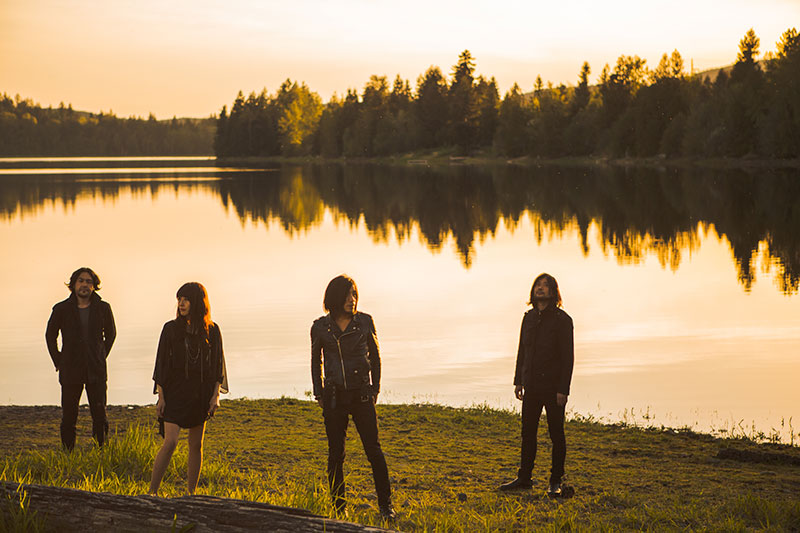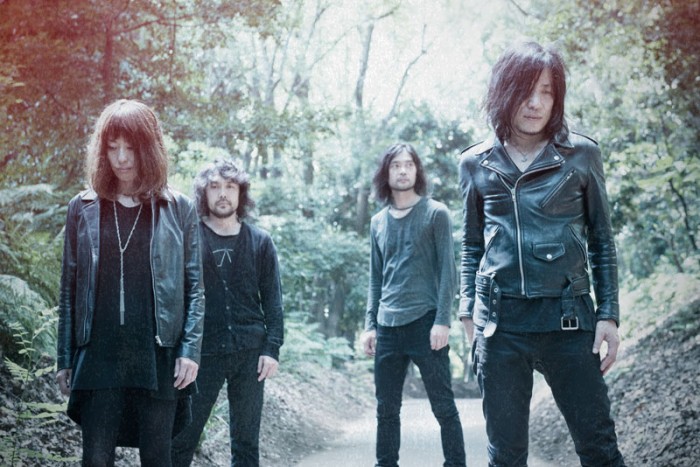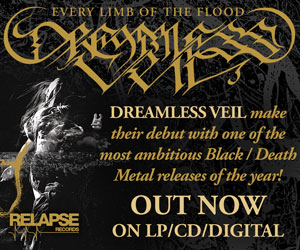Created in Japan at the end of the 90s, Mono have already turned into an institution of post-rock/instrumental music during their more than 15 year long career.
Although their music has an ambitious vibe – they have played with orchestras around the world – the band never left noise aside; guitar player Takaakira “Taka” Goto and his bandmates intercalate and mix calm and beautiful moments with amazing explosions of distortion and feedback.
In this interview, done via e-mail at the beginning of 2015, Taka talks about all this and also the records that changed his life, among other things…
You used to release a record every two or three years, but that changed in 2014, when you released two “companion” records, Rays of Darkness and The Last Dawn. Why did you decide to go the way of giving them different names and cover art instead of just releasing a regular double album? And is there any special double album out there (released together or separate) that acted as a kind of inspiration for you doing this?
Taka: Now that I think of it, I always tried to create something cinematic that could help overcome my sadness up until now. But this time, I faced a serious creative block. I didn’t have any inspiration or storyline that I wanted to write about.
I’ve been doing this for over 10 years now. Write an album, do some interviews and then go on a long tour, repeatedly, then try to write some songs between those times while I’m back in Japan for like 2 weeks – then again make a record based on those fragments I left behind.
I think I forced myself too much this time. The more and more I think about it, I can’t come up with any ideas. Every time I returned home, even though I tried, instead of leaving some song ideas behind, all I could do was pack my suitcase and go back on tour, again and again and again. I think I basically reached my limit physically and mentally by the end of it.
Don’t get me wrong. Every time we played live, I experienced something wonderful through our fans, but in every other place, all I could feel was an absolute void. I can’t write any songs, there is no inspiration, no one can help me, and eventually, I was even unable to listen to any music to refresh my mind. Books, movies, colleagues, friends – there was nothing that could fulfill me in any way. I know this ist a pleasant story to hear, but every time before going on the stage, I vomited, and often had sleepless nights because of the gastric pain from it.
Through this pain, I came to a realization that my duty now is to make those feelings into sounds – the suffering, the void, the agony, the endless fear and anxiety. I could no longer care about the thin layer of hope I had. It felt like this was the only thing I had left to try.
But when you actually start writing based on these feelings, your daily life starts to become much darker and more depressing. For example, even when I got out of the studio, my feelings were very rebellious, without any thoughts, almost as though I had sold my soul to hell.
In the summer of 2013, I had the opportunity to write music for some TV series and movies, so without thinking about it and not necessarily for MONO, I decided to write completely different types of songs. I started to change my lifestyle as well; before, I almost always wrote songs late at night, but I started writing early in the morning or in the afternoon instead. Eventually, these new songs started to become like medicine, just to get me through my everyday life.
At that time, I had no intention of releasing two albums at the same time. But as time went on, I started to be able to accept the songs I wrote when I was in a really bad place, the songs which represented the dark side of me, the songs that I didn’t want to go near, at least for a while. I then had thoughts about making all these songs as one album, but it just did not feel right.
The Last Dawn is an opposition album to Rays of Darkness. It is essentially an album about escaping from the darkness and seeking the light. At least, for me, anyway. This is why we decided to release the songs as two albums.
By the way, how was it to record these kinds of opposing records at the same time? Did you already have all the songs finished before going to the studio?
The way we’ve been doing it is that I write all the songs, create a complete demo and give it to the other members prior to the recording, then we practice and go into the studio.
Rays of Darkness (2014) was your first record in 15 years to feature no orchestral instruments whatsoever, and as you describe it, it’s a really dark and heavy record, not just on the distortion side. What took you in this direction? And do you think this is your most “metal record” so far?
I originally wanted to create something original, symphonic and spiritual like Beethoven, but with electric guitars. So far, we have managed to experience so many things, more than any indie band can ask for, like playing with a full orchestra in New York, London, Australia and Tokyo. From these experiences, we tried something more complex and classical for our previous album For My Parents, but at the same time, we started to raise some concerns. During the album’s American tour, we started to feel as our sounds were like a spineless dinosaur when compared to our old sounds. Sure, symphonic music is loud, epic and dreamy, but there is something lacking when compared to Rock music, like the pressure and destruction it can bring.
We originally started off as a four-piece, and even though our concerns started to rise much earlier, we just took them as a required risk to challenge ourselves with something new. But as we toured more, we started to know for certain that our feelings were right.
Going back to the original root was an easy thing to do, but also, we all didn’t want to do what we had already done. I really thought about this a lot. I needed to find a new method that could show my current emotions, and I truly believed that would allow us to see a new world.
Even though The Last Dawn has kind of a different sound from Rays of Darkness, they both share the same vibe, maybe a more direct approach than your previous releases, like For My Parents. Do you agree with that? And is there anything in special that took you through this side –to be more stripped down, let’s say?
The main human emotions are divided into positivity and negativity, and let’s say that they’re both 50/50 to begin with. If we have even 1% more positive emotion, everything will start to lean towards the light. To put it simply, for The Last Dawn, in a minimalist approach, I wanted to express that regardless of your current situations or emotions, if you accept everything as it is and find more positivity, you will eventually be able to overcome all the negativity.
On the other hand, for Rays of Darkness, I wanted to express that if you have even 1% more negative emotions or thoughts, the chaos will eventually spread and drag you down to darkness without you noticing it. I just started to think that even though everything is in disorder, there is something that’s always in order. I really wanted to express that to the world as art.
You have already worked with Steve Albini for a long time. Is there any other producer you would like to work with?
It would be great if we could work with someone like Daniel Lanoise.
Your music obviously transcends cultural boundaries. I mean, you play in a rock/metal instrumental band from Japan and you have fans all over the world. Why do you think people have this connection with the songs you write?
We feel very honored. All the songs are written from personal experiences and for ourselves, so if these songs that we need for ourselves become some a sort of power, courage and hope for someone else to share, it makes us feel less alone and that we’re here for someone else.
When I listen to your music, it always gives different meanings to the things that are happening around me – like if I’m in the subway in São Paulo or anywhere, or I’m going through a rough day, for example. Do you think is possible to look at Mono’s songs as these kind of “soundtracks for life”?
If that’s the truth, it makes us very happy and we hope that’s the case for everyone.
What’s the meaning of the band in your life? I mean, when you started the band, did you imagine that you would be together for so long?
Nothing has changed since we formed the band. We hope to succeed, imagine, focus on what we can do now and tackle them one by one.
The past 16 years went by really fast. We toured all over the world every year and it was like growing up from a child to an adult. Everything we saw was fresh; everything we did was an adventure and unknown; it was a repetition of excitement and setbacks.
We feel that everything was a necessary process to learn everything that’s important in our lives.
How is the “alternative” scene over there in Japan? Has it changed a lot since you started?
I don’t think it has changed dramatically. This country is filled with complex yet almost junk food like music that you have trouble calling art.
Do you all still live in Tokyo? If so, I wanted to know what’s the role the city “plays” in your music, if its soundscape and vibe have any direct influence on Mono as a band. Do you think that Mono would sound the same if you lived in another place, like Europe or US?
We all currently live in Tokyo, but all of our members come from rural areas that are very far from Tokyo. They are all completely different from Tokyo, surrounded by trees, rivers, oceans and mountains. In the winter, the cities are covered in snow and completely white.
I think they were a big part of finding calmness within our hearts, especially while living in such a chaotic large society, and to never lose ourselves and find freedom through constant pressure and competition within ourselves.
If we were born and grew up in America or Europe, I think our music would have sounded different. It’s an interesting idea to imagine such a thing.
What bands/artists do you consider to be your “kindred spirits” (in Japan or anywhere in the world)?
Beethoven.
And do you agree with Boris when they say that “noise is Japanese blues”?
That sounds like them. Boris are good friend of ours. I can understand why they’d say that.
Please tell me three records that changed your life and why they did it.
Beethoven Symophony No. 9 – World’s 1st punk rock
Led Zeppelin IV – World’s greatest rock band
My Blood Valentine Loveless – Pioneer of beautiful noise guitar
When did you start to play guitar and what were your influences back then?
I originally started learning folk guitar by copying my brother. He also picked up an electric guitar a little later and started listening to Hard Rock such as Deep Purple. That’s also when I started playing electric guitar, but I also started to write my own songs as well. I was only about 15 years old.
As I am from Brazil, I have to ask this one. What Brazilian bands/artists do you know?
Sepultura. They are absolutely amazing.
What’s the biggest challenge you ever faced in your career?
Playing with a 24 piece orchestra called “Holy Ground Orchestra” in New York, London, Melbourn and Tokyo.
This is the last one. How do you want to be remembered?
As a Rock band that filled the world with light from the Far East.












